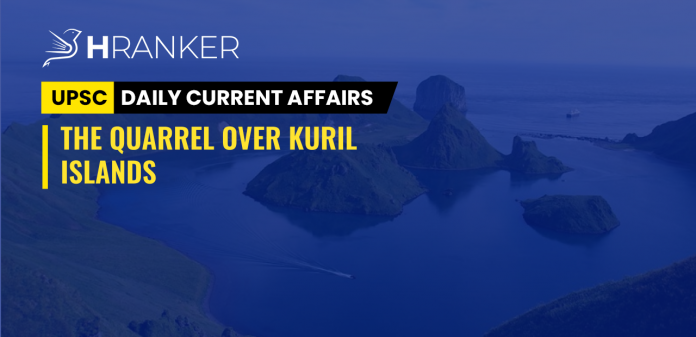WHAT’S IN NEWS:
On April 22, Japan’s diplomatic bluebook for 2022 described the Kuril islands (which Japan calls the Northern Territories and Russia as the South Kurils) as being under Russia’s“illegal occupation”. This is the first time in about two decades that Japan has used this phrase to describe the dispute over the Kuril Islands. Japan had been using softer language since 2003, saying that the dispute over the islands was the greatest concern in Russia-Japan bilateral ties.
KEYWORDS:
1. HABITUAL OFFENDER: A habitual offender, repeat offender, or career criminal, is a person convicted of a crime who was previously convicted of crimes. Various state and jurisdictions may have laws targeting habitual offenders, and specifically providing for enhanced or exemplary punishments or other sanctions
What are the Kuril Islands/ Northern Territories?
These are a set of four islands situated between the Sea of Okhotsk and the Pacific Ocean near the north of Japan’s northernmost prefecture, Hokkaido. Both Moscow and Tokyo claim sovereignty over them though the islands have been under Russian control since the end of World War II. The Soviet Union had seized the islands at the end of World War II and by 1949 had expelled its Japanese residents. Tokyo claims that the disputed islands have been part of Japan since the early 19th century.
What lies behind the dispute?
According to Tokyo, Japan’s sovereignty over the islands is confirmed by several treaties like the Shimoda Treaty of 1855, the 1875 Treaty for the exchange of Sakhalin for theKuril Islands (Treaty of St. Petersburg), and the Portsmouth Treaty of 1905 signed after the Russo-Japanese war of 1904-05 which Japan had won. Russia, on the other hand, claims the Yalta Agreement (1945) and the Potsdam Declaration (1945) as proof of its sovereignty and argues that the San Francisco Treaty of 1951 is legal evidence that Japan had acknowledged Russian sovereignty over the islands. Under Article 2 of the treaty, Japan had “renounced all right, title and claim to the Kuril Islands.”
However, Japan argues that the San Francisco Treaty cannot be used here as the Soviet Union never signed the peace treaty. Japan also refuses to concede that the four disputed islands were in fact part of the Kuril chain. In fact, Japan and Russia are technically still at war because they have not signed a peace treaty after World War II. In 1956, during Japanese Prime Minister Ichiro Hatoyama’s visit to the Soviet Union, it was suggested that two of the four islands would
be returned to Japan once a peace treaty was signed. However, persisting differences prevented the signing of a peace treaty though the two countries signed the Japan-Soviet Joint Declaration, which restored diplomatic relations between the two nations. The Soviet Union later hardened its position, even refusing to recognise that a territorial dispute existed with Japan. It was only in 1991 during Mikhail Gorbachev’s visit to Japan that the USSR recognised that the islands were the subject of a territorial dispute.
Have there been attempts at resolution?
Since 1991, there have been many attempts to resolve the dispute and sign a peace treaty. The most recent attempt was under Prime Minister Shinzo Abe when joint economic development of the disputed islands was explored. In fact, both countries had agreed to have bilateral negotiations based on the 1956 Japan-Soviet Joint Declaration. Russia was even willing to give
back two islands, the Shikotan Island and the Habomai islets, to Japan after the conclusion of a peace treaty as per the 1956 declaration. Japan’s attempt to improve ties with Russia was driven by its need to diversify energy sources and Russia by its need to diversify its basket of buyers and bring in foreign investments. But nationalist sentiments on both sides prevented
resolution of the dispute.
WHAT NEXT FOR JAPAN:
Japan has been among the most steadfast of Western allies in denouncing Russian aggression and punishing it with sanctions. The April 22 statement in its Diplomatic Bluebook will further damage relations between the two countries.
- Japan has probably been spurred by its fears of a Russia-China alliance as Japan itself has territorial disputes and an uneasy history with China.
- Secondly, Japan might have felt that this is a good opportunity to further isolate Russia and paint it as a “habitual offender” of international law.
- Finally, Tokyo might have been prompted to take this position as it feels that the invasion of Ukraine proves that getting back the Kuril Islands is a lost cause.
- Japan’s policy shift on the Kuril Islands will only embitter bilateral relations with Russia while advancing the possibility of its two neighbours, China and Russia, coming together against it.
OTHER TERRITORIES IN DISPUTE INVOLVING JAPAN:
TERRITORY DISPUTING COUNTRIES
1. Okinotorishima Japan, China, Taiwan, South Korea
2. Senkaku Islands Japan, China
3. Liancourt rocks Japan, South Korea, North Korea




